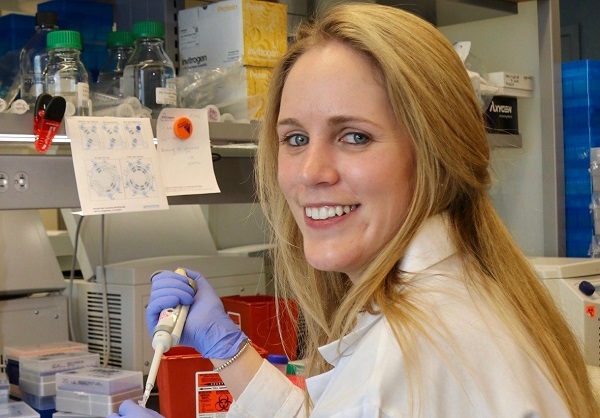The researcher putting platelets under the microscope to explore their part in the origins of heart disease
Medical science understands the role of platelets to both heal and harm. The tiny cell fragments, components of our blood, rush to the site of wounds or haemorrhages to stop bleeding. Perversely though, the clots they create can also block blood flow, making them major culprits in strokes and heart attacks.
But new research is shedding light on the role platelets might play at the very earliest stages of cardiovascular disease, when life-threatening plaque is just forming. This new information could help reduce the risk of cardiovascular disease and, in turn, save lives.

It’s the part that platelets seem to play in the development of plaque that is of special interest to Dr Tessa Barrett, currently research assistant professor at New York University Grossman School of Medicine. Her promising work in this field has earned her a NSW Government Cardiovascular Elite Postdoctoral Researcher Grant*, enabling her to return to Sydney after eight years spent in prestigious labs in New York.
“I always planned to come home, it’s just been a long time,” laughs Barrett. Born in Adelaide, she grew up in Sydney in a family previously not involved in science, but found her way thanks to an inspiring high school maths teacher who provided opportunities and connections to other young women working in the field.
She pursued forensic science at the University of Technology in Sydney and, armed with an undergraduate chemistry degree, joined the Heart Research Institute as a mass spectrometry research technician.
It was there that she first encountered the problem-solving power of multidisciplinary teams: specialists bringing their unique skill sets together, seeking answers to the same questions. She also found her passion for cardiovascular research.
“I was very interested, in that what we were doing in the lab was directly relatable – translatable – to people who had experienced cardiovascular disease or had a heart attack. I was drawn to the translational aspect of the research and how you could see it directly benefiting somebody.”
After completing her PhD at the Heart Research Institute and the University of Sydney, Barrett headed to the US to take up postdoctoral opportunities that gave her greater exposure to preclinical models of cardiovascular disease. She has worked in 2 highly regarded cardiology labs, investigating a range of fascinating problems spanning basic research to clinical trials.
“One of the studies I work on investigates why the clinical symptoms and triggers of heart attacks in women differ to men. You can have a heart attack with a lot of plaque in your artery, or one without. The ones without are a lot more common in women and they’re often misdiagnosed. So, we’re looking at the mechanism as to why women are more likely to have this type of heart attack versus men,” she says.
“It’s still very early stages, but our data suggests that these heart attacks are likely linked to altered oestrogen signalling in white blood cells, and induced by psychological stress. It’s not something we went into [the study] expecting, but it comes up again and again.”
It is her work in understanding the previously unrecognised part platelets play in the origins of cardiovascular disease and how diabetes may further impact this, that will bring her back to the Heart Research Institute in Sydney to put the $1 million Elite Postdoctoral Researcher Grant to good use.
“We recently found that by contributing to inflammation, platelets can accelerate the narrowing of arteries and subsequent atherothrombosis or blood clots, protagonists of heart attacks and strokes.”
The indications are exciting for a range of reasons, Barrett explains, including the potential for effective new therapies.
“Current drugs that target platelets are really only targeting their ability to promote thrombosis at the very end stages. Currently, we don’t know how platelets contribute to the growth of the plaque, and whether this potentially represents a way in which to reduce cardiovascular risk.”
Having lived and worked in New York through the emergence of COVID-19, Barrett is winding up her research work there and is looking forward to being back in Sydney in early 2021 to put together her own research team.
“This is a fantastic opportunity and a very generous grant,” she says. “It’s the first time it’s been offered, and it’s very exciting that it’s worked out this way. I’m lucky.”
By Michelle Schlechta
*At this stage Dr Tessa Barrett has decided not to pursue her work at the Heart Research Institute, nor will she take up the Elite Postdoctoral Researcher Grant, as she has extended her time overseas.
Updated 3 years ago